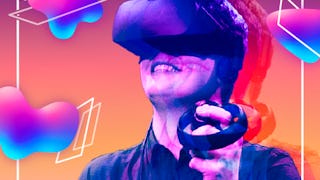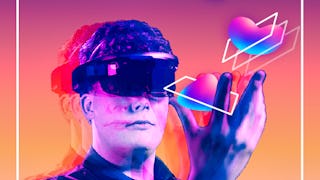This course is designed to teach you about Extended Reality (XR) and how it's used in healthcare education and clinical practice. Using lessons from experts in the field and different case studies, this course shows you how to use this innovative technology in a way that creates sustainable, accessible real-world applications.

Enjoy unlimited growth with a year of Coursera Plus for $199 (regularly $399). Save now.

Recommended experience
What you'll learn
Differentiate between types of Extended Reality (XR) and identify devices applicable to various use cases.
Analyse the application of XR to medical education, using evidenced-based pedagogy and principles of inclusivity, diversity, and accessibility.
Recognize the value of Extended Reality application to clinical practice in healthcare and identify suitable opportunities and design practice.
Identify valuable expertise which enables successful progression and application of Extended Reality in medical education and clinical practice.
Skills you'll gain
- User Centered Design
- Augmented and Virtual Reality (AR/VR)
- Education Software and Technology
- Medical Devices
- Augmented Reality
- Virtual Reality
- Health Technology
- Display Devices
- Critical Thinking
- Solution Design
- Patient Safety
- Emerging Technologies
- Project Planning
- Healthcare Project Management
- Virtual Environment
- Innovation
- Clinical Practices
Details to know

Add to your LinkedIn profile
5 assignments
See how employees at top companies are mastering in-demand skills

There are 4 modules in this course
This week you will explore the fundamentals of Extended Reality and simulation. The important distinctions between Augmented, Virtual and Mixed Reality will be highlighted. By the end of the week, you will be better placed to consider various XR devices based on specifications and capabilities and how these will potentially support your use of the technology within healthcare.
What's included
3 videos11 readings1 assignment1 discussion prompt2 plugins
Using Extended Reality to enhance learning experience can be achieved by exploring educational considerations and the impact of XR on information retention, cognitive load, inclusion, diversity and accessibility. You may not have formal training in education, however, what is important is to recognise your strengths and limitations. By studying this week’s materials, you will identify the importance of including expert educationalists in your team. This knowledge will help build your business case. Important questions to ask are: What is the problem you are trying to solve or improve? Who are your users and what are their needs? How does technology enhance their learning experience?
What's included
5 videos16 readings1 assignment2 discussion prompts1 plugin
This week you will explore how Extended Reality can be used in clinical practice. Focus on the lessons learnt by the experts as they discuss various challenges and successes of using XR. From these lessons identify how you will shape your use of XR and potentially integrate these ideas into your business case.
What's included
3 videos7 readings1 assignment3 discussion prompts
With your new understanding of Extended Reality in healthcare, it is important to explore the real world translation of this innovation. A business case helps provide rationale for implementing a project or new programme effectively. It is a strong approach to justifying application of Extended Reality to medical education or clinical practice. This week focuses on practical concepts and developmental steps. Expert contributors will contribute different 'lessons learnt' from their XR experience and will give succinct descriptions of the tools/software and phases used in the process of building a XR development. This last week of the course ends with a non-assessed business case exercise and leads to the final graded quiz.
What's included
4 videos9 readings2 assignments3 discussion prompts2 plugins
Offered by
Explore more from Patient Care
 Status: Free Trial
Status: Free TrialUniversity of Michigan
 Status: Free Trial
Status: Free TrialUniversity of Michigan
 Status: Free Trial
Status: Free TrialDuke University
 Status: Preview
Status: PreviewThe University of Sydney
Why people choose Coursera for their career





Open new doors with Coursera Plus
Unlimited access to 10,000+ world-class courses, hands-on projects, and job-ready certificate programs - all included in your subscription
Advance your career with an online degree
Earn a degree from world-class universities - 100% online
Join over 3,400 global companies that choose Coursera for Business
Upskill your employees to excel in the digital economy
Frequently asked questions
No, learners don’t have to own a VR headset to participate in the course.
No, this course won’t require coding skills.
To access the course materials, assignments and to earn a Certificate, you will need to purchase the Certificate experience when you enroll in a course. You can try a Free Trial instead, or apply for Financial Aid. The course may offer 'Full Course, No Certificate' instead. This option lets you see all course materials, submit required assessments, and get a final grade. This also means that you will not be able to purchase a Certificate experience.
More questions
Financial aid available,



